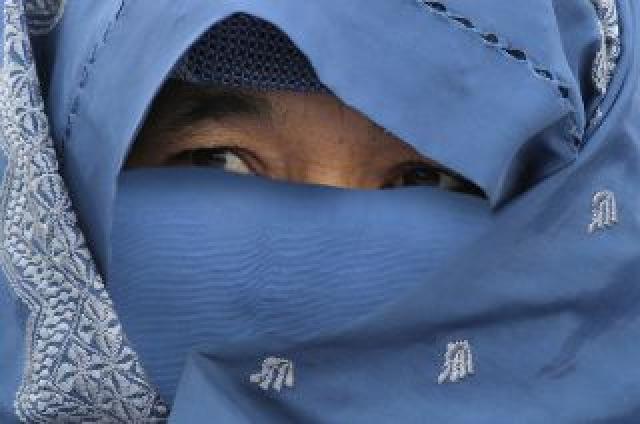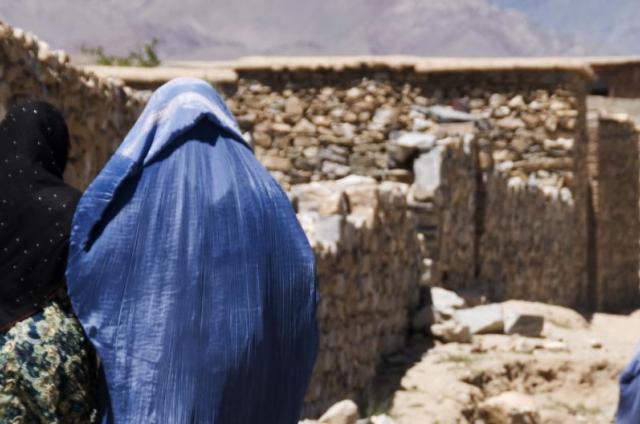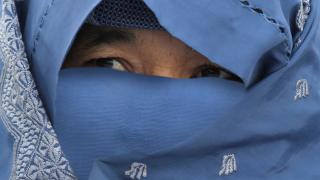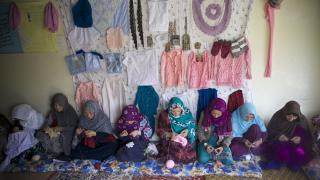No one hears our voices: Afghanistan report
Afghan women share their hopes and fears
In their own words, Afghan women call for women’s rights, inclusion in public life, urgent economic relief, and for the international community to step up in solidarity with them.
Over the past year, women in Afghanistan have faced growing restrictions on their rights as their country descended further into a devastating humanitarian and economic crisis. Women for Women International has been continuing and expanding its programmes to reach more women, and along the way we have been asking Afghan women we serve about their needs, challenges, and priorities.
When we conducted follow-up surveys and interviews with 204 women this July – nearly a year after the fall of Kabul and six months after our last survey – Afghan women shared stories of daily struggles for survival and dimming hopes for their futures.
The international community must listen to our voices on women’s rights like education and our employment.
Explore the "No One Hears Our Voices" report
"No One Hears Our Voices": One Year Update
"No One Hears Our Voices": Report March 2022
"No One Hears Our Voices": Summary March 2022
Between December 2021 and February 2022, Women for Women International conducted phone surveys and interviews with current and former participants of our programmes across Afghanistan and Afghan women’s rights activists and organisations continuing their work within Afghanistan.
The objective of these conversations was to better understand their current experiences and primary challenges, identify any promising support mechanisms, and to listen to their self-articulated hopes for their future.
One overarching message emerged: the international community still has an important role to play in exercising its power and leverage to support Afghan women’s rights and alleviate the economic crisis affecting the country.
In July 2022, almost a year after the fall of Kabul, we conducted a follow-up survey with women and Afghan women’s rights organisations.
They describe a harrowing situation which has significantly worsened since we last spoke with them in December of last year. Rather than improving, Afghan women cite new and worsening struggles to access healthcare and water due to deteriorating infrastructure and lack of services. Afghan women say that over the past year, they have turned to a broader spectrum of negative coping mechanisms including child marriage and selling some of their children in order to feed the others.
Previously if we were eating two times meal, now we are eating one time and also from one loaf of bread we have reduced it to half a loaf.
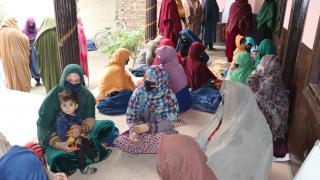
Afghan women call for support that goes beyond solely humanitarian aid – which, according to our survey, often does not reach the marginalised women we work with.
They call for the international community to:
- prioritise long-term economic solutions that restore jobs and economic activity so they can support themselves and their families
- Afghan women also want their daughters to go back to school
- and for the international community to stand with them in upholding their basic rights

Many of the recommendations in this report call for women’s rights, participation, and inclusion in public life within Afghanistan.
But beyond acting on these specific recommendations, policymakers and advocates alike must embed participation and inclusion of Afghan women into our processes for developing recommendations and policies henceforth by directly engaging with Afghan civil society and asking and listening to Afghan women, themselves.
The future of Afghanistan is dark and unclear, especially for women.
If they completely take our freedom, we cannot go to school. We cannot speak freely to ask for our rights. We cannot go to work to earn money and live our lives as women do in other countries.
Most of the people are suffering from hunger and do not have food to eat today, so how can they have hope for the future?
To truly ACT with Afghan women, we first must hear their voices, understand their needs and priorities, and we must embrace their hopes for their own futures as our own.
It's not too late to Act With Afghan Women.
EXPLORE THE "NO ONE HEARS OUR VOICES" REPORT - ONE YEAR UPDATE.
Learn more about our work in Afghanistan
Our Afghanistan Response
subtitle:
We’re thrilled to share that after pausing the programmes for security reasons in August 2021, we have now reopened our first training centre in Afghanistan. We have enrolled 350 Afghan women so far, across two training centres that were reopened in Nangahar province.
Please Don't Forget Afghanistan
subtitle:
Latifa Faqirzada worked for Women for Women International - Afghanistan for nearly four years. With the help of the UK government, she left Kabul in August 2021 during the final days of the US/UK troop withdrawal. She is currently residing in London and advocating for the women who remain in Afghanistan. This blog is her personal story.
Our Work in Afghanistan
subtitle:
Since 2002, Women for Women International - Afghanistan has reached more than 130,226 women through our work.

